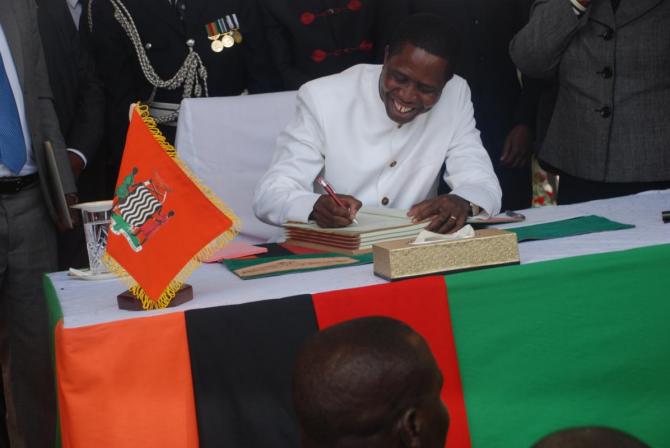By Charles Mafa
Five years after former President Edgar Lungu signed the Constitution Bill at the national Heroes Stadium at a ceremony that attracted thousands of Zambians, demands for a new Constitution are slowly emerging.
When Mr Lungu assented to what he described as a people-driven Constitution on Tuesday 5 January 2016, he said in his speech that the constitution amendment bill had addressed a variety of issues, including demands by citizens to have the president elected by over 50 per cent of the valid votes cast and the provision of a running mate to a presidential candidate.
He said the constitution amendment bill had removed the uncertainty surrounding the date of elections. National elections are now held on the second Thursday of August in an election year.
He also said that Zambians would know in advance the successor of the Republic President through the running mate should the office of the President fall vacant for one reasonor another.
Mr Lungu further observed that the constitution amendment bill would enhance political stability, a prerequisite for attracting increased levels of investment and improving the business environment in general.
But it seems Zambians must brace themselves to walk the same road again and expect to produce different results.
The debate about whether or not Zambia needs to revise its constitution is slowly gaining momentum and those demands are increasing.
“In my view, we need a new constitution in order to redesign the state to make it responsive to the needs of the people,” said Dr O’Brien Kaaba, in a recent interview with News Diggers.
He said: “The current constitution, as we saw in the last few years, is incapable of disciplining and limiting government and serving as the moral sail of the country for various reasons.”
His argument is that “the quality of a constitution is not dependent on the merit of individual provisions considered in isolation, but the culture of constitutionalism and national ideology it generates in practice”.
Dr Kaaba who is also lecturer of law at the University of Zambia believes the current constitution ineffectively deals with many fundamental constitutional issues such as under-representation of women and youths in government and that it pays a blind eye to ethnic diversity and inclusion.
He said the current constitution hardly deals with fundamentals of administrative justice, leaving citizens at the mercy of outdated common law doctrines.
“Institutions that support democracy such as the office of the Public Protector are poorly designed and wrongly clustered with institutions such as the prison commission which serve fundamentally different purposes, the judiciary and legislature continue to be marginalised and dominated by the Executive and the electoral process is not inclusive but designed to enhance polarisation by entrenching a winner-take-all outcome,” he said.
Zambians have been on the same path before, including the recent process that was initiated by late president Michael Sata in 2011.
Mr Sata appointed a technical committee comprising 20 eminent Zambians to draft a constitution. The committee was given 12 months in which to conclude its work and released the first draft first draft for public scrutiny in April 2012.
But a distinguished Zambian legal academic, Muna Ndulo, professor of law at Cornell Law School in the United States, had cast doubts on the credibility of the process.
Professor Ndulo helped to draft the constitutions of South Africa, Zimbabwe, Kenya and Afghanistan. He worked in Johannesburg between 1992 and 1994 as chief legal and political adviser to the United Nations. Ndulo holds a master’s degree in law from Harvard University in the US and a doctorate from Trinity College, Oxford, in the United Kingdom, however has never been invited to take part in any of Zambia’s several constitution-drafting processes.
In May 2012, Prof. Ndulo was visiting Zambia told a group of Catholic student priests at St Dominic’s Major Seminary in the Zambian capital, Lusaka, that Mandela’s selflessness had ensured that the constitution-making process was a great success.
“I remember him walking into a discussion at Kempton Park … and he said: ‘You guys are working on the constitution, please do one thing – don’t draw an ANC constitution. You are here to draw a South African constitution. We can discuss policies after that. Please look at the larger picture.”
One of the main reasons for why the South African constitution process succeeded, Prof. Ndulo said, was because people talked. “There was a debate for one year just about what do we want to do. So they said: ‘We want to have a non-racial society, yes, we want a society that is not sexist.’
And those principles were drawn and then adopted by legislation.”
Prof. Ndulo added: “If you look at the Zambian process, we don’t have a legal framework within which we have been doing things. We had commissions … and you see the problem with the commissions is that you report to the president and after that you have no control.”
Experts say most successful constitutions were those in which there was a complete separation of powers between the three arms of government – legislative, executive and judicial.
Dr Kaaba said the process must be insulated from manipulation by a legal process and that credible people are chosen to lead the process.
“It is important that the persons who lead the process are experts in constitutional law and are chosen for their competence rather than party affiliation or social stature,” he said.
Photo: National Assembly of Zambia: Mr Lungu Assenting to the ‘People-Driven Constitution’

Discover more from MAKANDAY
Subscribe to get the latest posts sent to your email.



